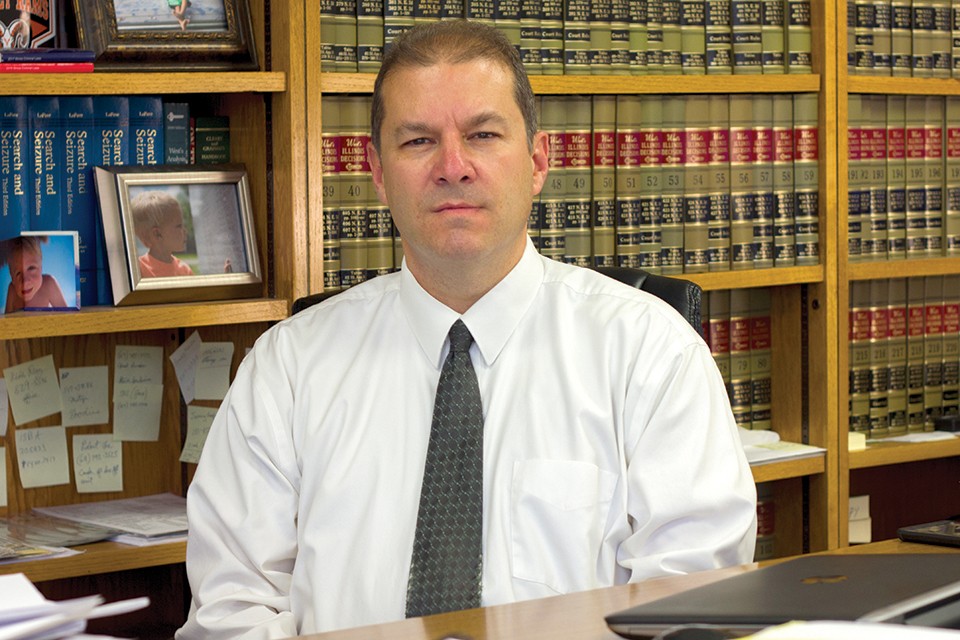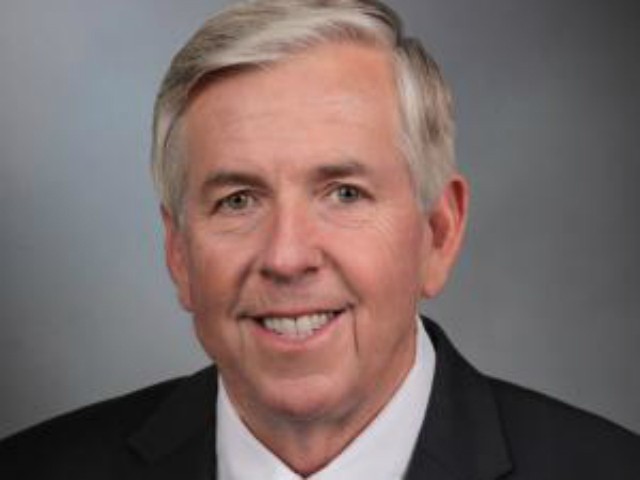
Kyle Swanson, the founder of KTS Predator Hunters, watched from inside a parked car as his target entered a Walmart in Fayette County, Illinois. It was after 11 p.m. on August 1, 2019.
Swanson is a broad-shouldered former Army veteran with a cherubic smile and a beard that he tends with a small comb during the livestreams. On that particular night, he wielded two phones, one for livestreaming to Facebook, the other for keeping contact with his decoy, who in real life is a 36-year-old mom from a small town in Missouri.
That night, however, she was texting with Christopher Cox, a 23-year-old from Vandalia who thought she was a fourteen-year-old girl. In reality, the decoy was watching the livestream and updating Swanson on their target's movements. Cox was walking into a trap.
After he entered the store, Swanson and a second predator hunter made their first move. They confronted the driver of the truck, which had dropped Cox off at the entrance, prompting the driver to peel out of the parking lot in a hurry.
There's no formality in Swanson. As Swanson filmed, Cox, a slight figure wearing a black T-shirt and jeans, emerged from the Walmart. Swanson got straight to the point, all while keeping the camera trained on his target.
"You here to meet a fourteen-year-old?" Swanson asks.
Like Sanchez, the shock of that question seems to root Cox to the ground. Cox also seemed to share a similar impulse for self-incrimination, and his very first response is to blurt out, 'I didn't know she was fourteen.'"
"Yeah?" Swanson huffed. "You've been talking to me the whole time, so nice try. Your ride's already gone. You're not going anywhere right now."
Swanson was incorrect. Cox launched himself into a dead sprint, flashing across the floodlight-illuminated parking lot toward a block of retails stores. In seconds, he'd vanished into the night. Swanson and his partner returned to their truck and drove around for several fruitless minutes as they tried to pick up the trail of their quarry, even peering inside a dumpster behind a Cricket Wireless. Cox wasn't in the dumpster. He was gone.
Cox's escape lasted a just few days. Within hours KTS' video had been shared hundreds of times, and it quickly racked up thousands of views. KTS' fans shared screenshots of Cox — whom Swanson had dubbed "The Runner" — and created their own posts and community alerts.
In a rural Illinois county, that sort of info tends to make waves. And that's how the incident came to the attention of Fayette County State's Attorney Joshua Morrison.
Morrison, in an interview, says he "immediately recognized" Cox's name and photos. Which made sense. Court records show that Cox had spent the previous five years in and out of trouble. In 2016, he'd pleaded guilty in a Fayette County court to felony aggravated domestic battery and was sentenced to four years in prison.
After recognizing Cox from previous cases, Morrison says he reached out to KTS, which provided Cox's chatlogs as evidence. The prosecutor was impressed. A detective subpoenaed Cox's phone and checked its messages, finding them just as damning as those gathered by KTS' decoys. Morrison says Cox hadn't just arranged to meet in the Walmart: He had tried to send an Uber to pick up the person he thought was a fourteen-year-old. He had used his own sister's credit card to order the ride.
"Everything KTS told me seemed to be correct," Morrison says, seated in his office on the second floor of the Fayette County courthouse. He notes the skill of the KTS decoys, who "make it very clear that they are fourteen" during the chats. That's the key to bringing charges.
"As long as the person acknowledges that at some point in there, 'I understand you're fourteen,' and they don't have a problem and they continue — the law allows Illinois to prosecute for just exactly that."
For Morrison, the August bust of Cox began a productive partnership between KTS and Fayette County. Two weeks later, Swanson filmed as Fayette officers handcuffed Kyle Upchurch in the electronics section inside the same Walmart where they'd met Cox. On August 30, Fayette police arrested a third KTS target, Joshua Corbin, who had sent hundreds of messages to KTS' decoy, believing he was talking to two underage teen girls.
By November, all three targets had pleaded guilty to indecent solicitation of a child, which by Illinois law mandates registration as a sex offender. Cox was sentenced to four years in prison. Upchurch — who was already a registered sex offender for aggravated sexual abuse of a fifteen-year-old in 2013 — got five years. Corbin, who had no criminal history, was sentenced to two years' probation.
The three cases were KTS' first convictions, but also the first known cases undertaken by a St. Louis-area predator hunting group in Illinois.
Morrison wasn't shy about linking his office's work with the predator hunters. In a Facebook post announcing the sentencing, his office described the investigations as "a joint effort between multiple law enforcement agencies and the KTS Predator Hunters."
Still, Morrison acknowledges that predator hunter groups aren't widely embraced on his side of the thin blue line. He doesn't see them as vigilantes, but is careful to separate their work for his own.
"They don't work for me, I don't tell them what to do," he says. "If they tell me 'Hey, we're going to do this thing in your town,' I can't tell them not to. My attitude is to prosecute people for breaking the law. If you bring me a good enough case, I'm going to do that."
For Morrison, part of the problem is the scale of cybercrime. Even in a rural Illinois county, he says the presence of online predators "is so pervasive that the police couldn't possibly catch everybody that's doing it."
Morrison has heard the critiques of the groups before, but he compares the predator hunters' role to that of a citizen's arrest or evidence gathered by traditional eyewitness testimony. And his office didn't simply submit KTS' video as evidence. That's what detectives and subpoenas are for.
Still, he admits that groups like KTS raise "a tough question" for law enforcement. On one other hand, predator hunting groups are taking enormous risks to ambush desperate men late at night. Then again, there are now fewer adults in Fayette County willing to do the sorts of things Cox, Upchurch and Corbin wanted to do when they thought they were talking to children.
"Who catches them is not as important as preventing them doing bad things to a child," Morrison says. "If it has the effect of chilling this kind of behavior in my county, I'm all for that."






